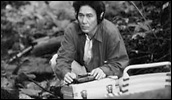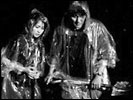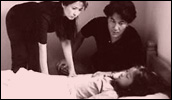Seance
- Year
- 2000
- Original title
- Korei
- Japanese title
- 降霊
- Director
- Cast
- Running time
- 97 minutes
- Published
- 20 August 2003



by Nicholas Rucka
A few months ago, I asked a Japanese filmmaker friend of mine which contemporary director was the most respected in Japan. Without hesitation he answered, Kiyoshi Kurosawa. This surprised me for the simple reason that in the US, at least, this would never be said about a horror director.
In the early 1980s, before moving on to direct his first feature works, Kiyoshi Kurosawa worked as assistant to Juzo Itami (of Tampopo fame). Indeed, not only did Juzo Itami have several cameos in Kurosawa's early films, it can be argued that Kurosawa's discipline and social sense as a director are largely attributable to Itami's mentorship. (Other directors that had a profound impact on Kurosawa's dramatic, thematic, and graphic (violence) sensibilities are Sam Peckinpah, Tobe Hooper, and Don Siegel.) However, it should not be understated that Kurosawa, while highly influenced by Itami's use of allegory for social criticism, decided to wield his own brand of allegory in a different manner by making uniquely Japanese horror films.
Fundamentally, the use of metaphor and allegory in horror is nothing new; an exhaustive number of critiques and analyses have been written at length about this. In Kurosawa's case, by weaving the violent horror threads with social commentary, the audience gets a thrilling and chilling ride that leaves us pondering the larger implications of his stories. Kurosawa's 2000 made-for-TV film Séance is a prime example of this.
Produced by Kansai Television and based on the Mark McShane novel Séance on a Wet Afternoon, it is the story of Koji Sato (Koji Yakusho), a sound effects artist for TV and film, and his wife Junko (Jun Fubuki), a freelance psychic medium. As the film begins, Junko is participating in an experiment with the police by using her psychic ability to aid them in a homicide investigation. While Koji is in the woods collecting sound effects, Yoko, a little girl who is fleeing her kidnapper, accidentally locks herself in his equipment case. Koji unknowingly transports Yoko back to his home, where he leaves the case in the garage for a few days. The police ask Junko for help in finding the missing girl. Later, while Junko is cleaning up the house, she senses that the unconscious girl is locked in the equipment case in the garage.
Fearing that the police would neither believe the coincidence, nor her psychic abilities, Junko devises a plan to keep Yoko at their home until she can safely meter out evidence for the police and eventually lead them to a dilapidated apartment complex where the girl would be found safe. However, the plan gets bungled when the girl wakes up and sees Koji's face. Now, worried that Yoko will mistake Koji and Junko to be the kidnappers, the plan becomes convoluted… and more imperative. Things turn for the worst when Koji accidentally kills the girl while struggling to keep her quiet in another room, while police are visiting downstairs. The nightmare, it turns out, is only beginning.
It's hard to feel detached while watching this film. On the one hand, the fact that Junko represents such a helpless minority who is not only marginalized but basically is mocked by society makes us immediately sympathize with her. In an allegorical sense, it is about any people who have ever been maligned by society and denied any chance to clear their name and prove themselves. They live behind the stamp of stereotype and any efforts made to improve, merely exacerbates the situation and the existing stigma.
From the outside, the fact that Junko and Koji decide to keep the missing girl prisoner in their house in order to achieve some sort of societal legitimacy (here represented by the police) can only be viewed as a selfish action. However, within the context of the film, it makes some degree of sense because we feel for Junko and the fact that she is constantly tormented by her ability to see ghosts. As a result, we discover that she is incapable of actively participating in society, in any sort of 'normal' sense, and therefore internalizes her frustration and despair. So when the opportunity appears for Junko to help the kidnapped girl while giving herself a purpose and an emotional outlet, she, quite naturally, seizes it… to a tragic end.
I'm not sure what I'd do given the same circumstances and that's what makes Séance a good film. Like life - to be trite - there are no easy answers; only 'what ifs' and 'should haves.' The film isn't only about the scares, though there are some really classy ones, but about the complexity of an outcast's social problems. While it can be argued that the film is bleak, I feel that it is accurately portraying the outsider's plight in a different and smart manner. (I have purposely avoided the fascinating doppelganger metaphor, to leave you something to ponder.)
Finally, I want to draw attention to what is turning out to be a defining Kiyoshi Kurosawa film trait - perhaps, this is what my friend was implying with his answer to my initial 'respected director' question? Kurosawa repeatedly focuses great attention on the unique and subtle (understated?) moments in his films. He rarely forces a moment and confidently allows his situations to unfold at their own pace, using his precisely placed edits to reveal information. (Ironically, I feel that this is in direct contrast to his favorite directors' films.) Here's an example:
While Junko is acting as a psychic medium for a young widower and her dead husband, Koji is sleeping in a neighboring room. He is woken up by something in the air; he rolls on his back and exhales a thin cloud of 'breath' - the temperature must have dropped…
And that's it. No explanation of what it is or why it has occurred. But this moment is something that is rooted in good background research on paranormal phenomena: purportedly, room temperature drops dramatically where there is a paranormal event. I didn't know this while watching the film, but I found the visual striking. It seemed to be an elegant touch of there literally being something mysterious 'in the air.'
Kurosawa, throughout many of his films, has visual moments that are as subtle, well thought out, or surprising. Suffice it to say that while Séance is not as strong as Cure, in my book, it is a good piece and certainly better than most of the recent horror fare in Japan and abroad.